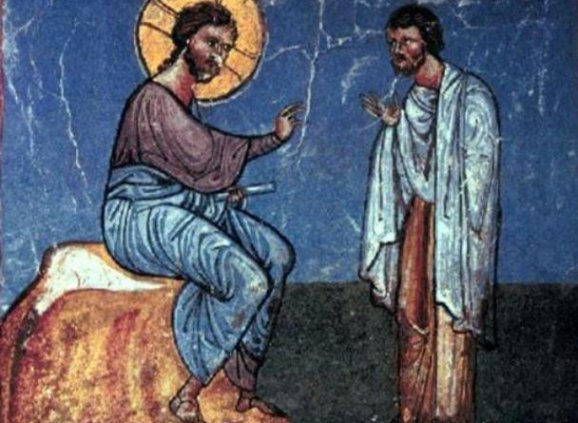
- Education Forums
Bible Study Guide for Oct 7, 2018: Proper 23 Year B

Proper 23: Sunday, October 14
• Amos 5: 6-7, 10-15
• Psalm 90: 12-17
• Hebrews 4: 12-16
• Mark 10: 17-31
The unknown author of the Letter to the Hebrews this week captures the essence of many of our recent scripture readings from the Revised Common Lectionary: “The word of God is living and active, sharper than any two edged sword, piercing until it divides soul from spirit, joints from marrow; it is able to judge the thoughts and intentions of the heart.” In his Galilean ministry as shown to us by Mark, Jesus has certainly been carving away at some of our deepest attachments: earthly notions of status and authority, the bonds of hometown and family, temple ritual. In the Chapter 9 lesson for Proper 21(September 30), he says “if your hand causes you to stumble, cut it off; it is better for you to enter life maimed than to have two hands and to go to hell, to the unquenchable fire.” His point is not amputation. He is instead attacking any understandings or compulsive attachments separating us from living fully into the Kingdom of God – synonymous in Mark’s understanding with “eternal life” as mentioned this week by the nameless man with many possessions.
The insight of the late political activist and bible scholar Walter Wink is helpful here. In his books which include The Powers that Be he understands “powers” as corporate intelligences embodied in social institutions like companies, churches, nations, and cultures. Idolatrous allegiance to such “powers,” submits Wink, limit our capacity to live fully into the image of God, the first and ultimate creator and giver. Wink understand the mission of Jesus as “freeing” the powers, and us from the powers, versus “combatting” them. This idea is evident in Mark’s gospel this week: “Jesus, looking at him [the wealthy man], loved him and said ‘You lack one thing; go, sell what you own, and give your money to the poor…’” Jesus’ love of the man is not contingent upon his divesting or not; it simply exists and cannot be earned through good behavior or right action. The man’s peace of mind and spiritual growth into a citizen of God’s kingdom (“freedom”) is another matter altogether. That he was “shocked” and “went away grieving” imply all that he is not free to do.
• Do you identify or not with the man who kneels before Jesus? How do you understand “compulsive attachment” as a force in your own life?
• Read this assigned portions of Amos. Compare and contrast the prophet’s writing on wealth with Mark’s story of Jesus and the wealthy man.
• In which ways might you free yourself from the “powers” of wealth and money?
- January 2024
- December 2023
- November 2023
- October 2023
- September 2023
- June 2023
- May 2023
- April 2023
- March 2023
- February 2023
- January 2023
- December 2022
- November 2022
- October 2022
- June 2022
- May 2022
- April 2022
- March 2022
- February 2022
- January 2022
- November 2021
- October 2021
- September 2021
- August 2021
- July 2021
- June 2021
- May 2021
- April 2021
- March 2021
- February 2021
- January 2021
- December 2020
- November 2020
- October 2020
- September 2020
- August 2020
- July 2020
- March 2020
- February 2020
- January 2020
- December 2019
- November 2019
- October 2019
- September 2019
- August 2019
- July 2019
- June 2019
- May 2019
- April 2019
- March 2019
- February 2019
- January 2019
- December 2018
- November 2018
- October 2018
- September 2018
- August 2018
- July 2018
- June 2018
- May 2018
- April 2018
- March 2018
- February 2018
- January 2018
- December 2017
- November 2017
- October 2017
- September 2017
- July 2017
- May 2017
- April 2017
- March 2017
- February 2017
- January 2017
- December 2016
- November 2016
- October 2016
- September 2016
- August 2016
- May 2016
- April 2016
- March 2016
- February 2016
- January 2016
- December 2015
- November 2015
- October 2015
- October 2013
- September 2013
At "Educational Forums," enrich your spiritual journey by exploring our resources including videos of lectures, essays by priests, and other pieces about our faith, our church, and what it means to be a disciple of Jesus in the 21st century.


Comments